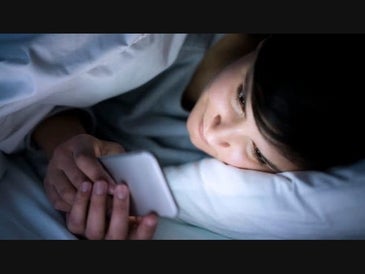This post was contributed by a community member. The views expressed here are the author’s own.
Kids & Family
Due the the pandemic children will be having classes online. How to parents manage appropriate screen time prior to bed with online school?

Due to the Coronavirus and having to shelter in place, many kids have been using computers, IPads and smartphones to entertain themselves. Also many teenagers state this is how they can still communicate with friends by texting, FaceTime or Zoom. Since it’s summer many parents are allowing their teenagers to use electronics more because there is not much to do as a result of the coronavirus. Additionally, many families have had to cancel or drastically change vacation plans due to the pandemic. This all makes sense and is appropriate given the situation we are living in and the limited number of options children and teenagers have to enjoy the summer.
While most parents are fine with the increase use of electronics over the summer, they are worrying about what happens when school resumes. Many families are still waiting for final decisions to be made by school districts. However, it appears based on medical advice and the recent increase in the spread of the Coronavirus that most children are teenagers will not be returning to their schools and instead they will resume online schooling like they were doing at the end of school last year. Whether they are returning to the physical school structure or doing school online, they still need the appropriate amount of sleep. Many parents are concerned with relaxing some of the rules around electronics, how will their children respond to less electronic time when school resumes and if there are difficulties, how will it impact their children’s sleep if they are using electronics prior to bedtime.
Research studies have shown the electronics, and especially screens, can be stimulating to children and teenagers brains. While that might be a good thing during the day, it’s not at night when it’s time for kids to sleep.
Part of the stimulation from electronic screen time is from the blue wave light that comes from screens. During the day, many things stimulate our brains, and blue wave light is one of them. But at night, blue wave light exposure sends a signal to the brain that it’s daytime. When exposed to blue wave light, children may struggle to wind down and begin the process of falling asleep.
Besides the effects of blue wave light, screen time affects sleep if children become stimulated having conversations over the phone or text, playing games, or engaging in social media. or movies might include disturbing themes or images that will affect sleep and emotional health.
How to Manage Screen Time for Better Sleep:
Your pediatrician may have their thoughts about how screen time affects sleep and you may want to consult your pediatrician about the appropriate amount of screen time before bedtime. Limiting screen time mostly to daytime hours is best. Blue wave light exposure during the day isn’t as problematic as nighttime exposure. And stimulation from screens during the day is normal.
As parents, it’s essential to set clear rules on screen time use. A good rule of thumb is to avoid screen time at least 2 hours before bedtime. Encourage kids to engage in other relaxing evening activities during that time as part of a healthy bedtime routine. They can read a book, work on a puzzle while listening to relaxation music, and get ready for the next day. The other rule parents should enforce is to avoid screen use in your child’s bedroom. Their bedroom should be an environment devoted to sleep and relaxation, and when you bring screens into it they may be tempted to engage rather than sleep. Additionally, when you bring your electronics into their bedrooms, you are sending a mixed message about not using electronics before beds. This may result in teenagers trying to use electronics in their bedrooms, when you think they are asleep. It is not uncommon for some teenagers to stay up until 2am texting or watching movies on their smartphones.
Another factor to consider is how screen time has replaced play time in some households. Kids who are using screens for many hours a day may be sedentary while they do so. Activity and exercise are a part of a healthy lifestyle, as they reinforce a circadian rhythm that’s in sync with the environment and allow kids to be tired when it’s time for .
Screens have become a part of everyday life and are an important tool for kids and adults. It’s imperative for parents to show their children the proper way to use screens without negatively affecting their lives. Take the lead to demonstrate responsible use so children can enjoy screen time as well as a good night’s sleep. Therefore, try to develop a nightly routine for yourself where you stop using electronics before you go to bed. By modeling appropriate behavior regarding electronics before bed, you increase the probability that your children and teenagers will follow your example and you also decrease the likelihood of arguments because you are not asking your children to do anything that you are not willing to do yourself.
Dr. Michael Rubino is a psychotherapist with over 20 years experience treating children and teenagers. For more information about his work or private practice visit his website at or his Facebook page at .
The views expressed in this post are the author’s own. Want to post on Patch?
Loading…
![]()
